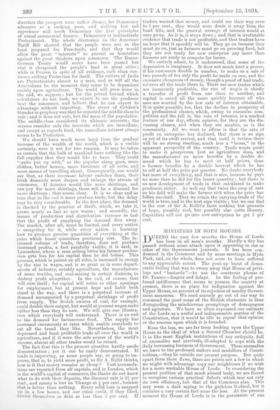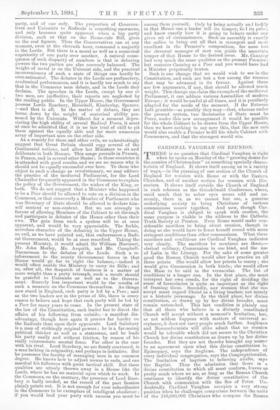MINISTERS IN BOTH HOUSES. D URING the past few months the
House of Lords has been in all men's mouths. Hardly a day has passed without some attack upon it appearing in one or other of the Government journals. It has been con- demned in the Commons and by mass meetings in Hyde Park, and, on the whole, does not seem to have suffered to any appreciable extent. The pent-up burst of demo- cratic feeling that was to sweep away that House of privi- lege and " bastards "—to use the courteous phrase of Dr. Tanner—lingers and delays. In the feeling of pro- found indifference that seems to possess the country at present, there is no place for indignation against the Upper House, on account of its rejection of sundry Govern- ment measures. We need scarcely go out of our way to commend the good sense of the British electorate in thus disregarding the mischievous promptings of demagogues and agitators. We have so often expressed our estimate of the Lords as a useful and indispensable portion of the Constitution, that it would be idle to repeat that opinion or the reasons upon which it is founded.
None the less, we are far from looking upon the Upper House as the ideal of what a Second Chamber should be. It is like most English institutions of any antiquity, full of anomalies and survivals, ill-adapted to cope with the daily increasing business of Government. These anomalies we leave to the professed makers and modellers of Consti- tutions,—they lie outside our present purpose. But quite apart from these flaws, there are points not a few in which we might with advantage copy our neighbours if we wish for a more workable House of Lords. In considering the present position of that much abused body, we are forced to recognise various practical defects which mar not only its own efficiency, but that of the Commons also. This may seem a dark saying to the guileless Radical, but it contains a very certain fact none the less. At the present moment the House of Lords is in the possession of one party, and of one only. The proportion of Conserva- tives and Unionists to Radicals is something enormous, and only becomes quite apparent when a big party division, such as that on the Home-rule Bill, gives us the real figures. Thus the Conservatives can at any moment, even at the eleventh hour, command a majority in the Lords. But there is a, moral as well as a numerical superiority of one party over another. A natural conse- quence of such disparity of numbers is that in debating powers the two parties are also unevenly balanced. The weight of metal is on the Unionist side, and the practical inconveniences of such a state of things can hardly be over-estimated. The debates in the Lords are perfunctory, academical performances, and it is hardly too much to say that in the Commons men debate, and in the Lords they declaim. The speeches in the Lords, except by one or two men, are ineffective, their reports are neglected by the reading public. In the Upper House, the Government possess Lords Rosebery, Herachell, Kimberley, Spencer, —and that is all. In the matter of debate, they are borne down by the weight of oratorical ability pos- sessed by the Unionists. Without for a moment depre- ciating the high ability of several Radical Peers, it must at once be admitted that it is no fair trial of skill to pit them against the equally able and far more numerous array of important men on the other side. As a remedy for these and other evils, we unhesitatingly suggest that Great Britain should copy several of the Continental nations, and allow her Ministers to sit and i deliberate in both Houses. This usage prevails in Prussia, in France, and in several other States ; in those countries it is attended with good results, and we see no reason why it should not be equally successful over here. To those who object to such a change as revolutionary, we may adduce the practice of the mediaeval Parliament, for the Lord Chancellor frequently appeared in the Commons to explain the policy of the Government, the wishes of the King, or both. We do not suggest that a Minister who happened to be a Peer should be allowed to vote on a division in the Commons, or that conversely a Member of Parliament who was Secretary of State should be allowed to declare him- self content or non-content. But we are strongly in favour of allowing Members of the Cabinet to sit through and participate in debates of the House other than their own. The gain from such a system will be at once apparent, and would be very appreciable. The feeble, nerveless character of the debating in the Upper House, an evil, as we have pointed out, that embarrasses a Radi- cal Government, would be at once remedied. Taking the present Ministry, it would admit Sir William Harcourt, Mr. John Morley, Mr. Asquith, and Mr. Campbell- Bannerman to the debates of the Lords. Such a re- inforcement to the scanty Government forces in that House would go far to right the balance,—indeed it would often enable the Ministry to carry its Bills ; and as, after all, the despatch of business is a matter of more weight than a party triumph, such a result should be grateful to Unionists as well as to the Govern- ment. Scarcely less important would be the results of such a, measure on the Commons themselves. As things now stand in England, each party is led by a Peer ; and as the two leaders are in the prime of life, there is every reason to believe and hope that each party will be led by a Peer for many years to come. In the present state of the law of the Constitution, each leader has to direct the affairs of his following from outside,—a manifest dis- advantage, though here again it presses far harder on the Radicals than upon their opponents. Lord Salisbury is a man of strikingly original powers ; he is a far-seeing political thinker as well as a statesman, and he leads his party easily and without friction, by reason of his really consummate mental force. Far other is the case with his rival. Lord Rosebery, we are firmly convinced, is i a man lacking in originality, and perhaps in initiative. But he possesses the faculty of managing men in no common degree. He knows how to adjust means to ends, and can marshal his followers with great tactical skill. But these qualities are utterly thrown away in a House like the Lords, where he has no material upon which to work. In the Commons, on the contrary, the presence of Lord Rose- bery is badly needed, as the record of the past Session plainly points out. It is not enough for your subordinates in the Commons to be exemplars of intelligent obedience ; if you would lead your party with success you must be among them yourself. Only by being actually and bodily in that House can a leader tell its temper, feel its pulse, and know exactly how it is going to behave under any given set of circumstances. Such an assembly is exactly the milieu to bring out all that is strongest and most excellent in the Premier's composition, for none but the cleverest manager of men can guide the uncertain temper of that House to the desired issue. Mr. Canning had very much the same qualities as the present Premier ; but conceive Canning as a Peer and you would have had a Minister perpetually beaten. Such is one change that we would wish to see in the Constitution, and such are but a few among the reasons that may be advanced in its favour. Against these are few arguments, if any, that should be allowed much weight. This change can claim the example of the mediaeval Parliament, it can adduce various Assemblies of modern Europe ; it would be useful at all times, and it is peculiarly adapted for the needs of the moment. If the Extreme Left grumble—as possibly they may—that, whereas under the present system, two Secretaries of State must be Peers, under this new arrangement it would be possible for the whole Cabinet to be drawn from the Upper House, then we have nothing to say save this, that the new rule would also enable a Premier to fill his whole Cabinet with Commoners, and that the strongest would win.



































 Previous page
Previous page